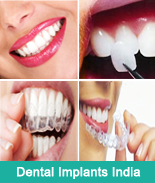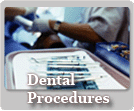 |
 |
|||||||||||||||
 |
|||||||||||||||
 |
|||||||||||||||
|
|||||||||||||||
Caries ( Dental Decay )
What is tooth decay, and what causes it?
Tooth decay occurs when your teeth are frequently exposed to foods containing carbohydrates (starches and sugars) like chocolates, sticky sweets, ice cream, milk, cakes, and even fruits, vegetables and juices. Natural bacteria live in your mouth and form plaque. The plaque interacts with deposits left on your teeth from sugary and starchy foods to produce acids. These acids damage tooth enamel over time by dissolving, or demineralizing, the mineral structure of teeth, producing tooth decay and weakening the teeth.
Factors that MUST be present to produce cariesHow are cavities prevented?
The acids formed by plaque can be counteracted by simple saliva in your mouth, which acts as a buffer and remineralizing agent. Dentists often recommend chewing sugarless gum to stimulate your flow of saliva. However, though it is the body's natural defense against cavities, saliva alone is not sufficient to combat tooth decay. The best way to prevent caries is to brush and floss regularly. To rebuild the early damage caused by plaque bacteria, we use fluoride, a natural substance which helps to remineralize the tooth structure. Fluoride is added to toothpaste to fight cavities and clean teeth. The most common source of fluoride is in the water we drink. Fluoride is added to most community water supplies and to many bottled and canned beverages.If you are at medium to high risk for cavities, your dentist may recommend special high concentration fluoride gels, mouth rinses, or dietary fluoride supplements. Your dentist may also use professional strength anti-cavity varnish, or sealants-thin, plastic coatings that provide an extra barrier against food and debris.
Who is at risk for cavities?
Because we all carry bacteria in our mouths, everyone is at risk for cavities. Those with a diet high in carbohydrates and sugary foods and those who live in communities without fluoridated water are likely candidates for cavities.Children and senior citizens are the two groups at highest risk for cavities.
Decay that is unique to adults:
Root cavities - As you age, your gums can recede, leaving parts of your tooth root exposed. Since there is no enamel covering your tooth roots, these exposed areas easily decay. Most people over 60 have root cavities as a result of gum disease.
Repeated decay around existing fillings - Decay can form around existing fillings and crowns. This is because these areas are not as smooth as a natural tooth surface and can decay easier.
Cavities from dry mouth - dry mouth is present due to a decrease in saliva.
What areas are likely to decay?
- Surfaces
- Teeth next to each other because this area is hard to clean
- Pits
- Fissures in the "chewing" (occlusal) surface of teeth
- Gum line
What can I do to help protect my teeth?
The best way to combat cavities is to follow three simple steps: Cut down on sweets and between-meal snacks. Remember, it's these sugary and starchy treats that put your teeth at extra risk. Brush after every meal and floss daily. Cavities most often begin in hard-to-clean areas between teeth and in the fissures and pits-the edges in the tooth crown and gaps between teeth. Hold the toothbrush at a 45-degree angle and brush inside, outside and between your teeth and on the top of your tongue. Be sure the bristles are firm, not bent, and replace the toothbrush after a few weeks to safeguard against reinfecting your mouth with old bacteria than can collect on the brush.. Children under six should only use a small pea-sized dab of toothpaste on the brush and should spit out as much as possible because a child's developing teeth are sensitive to higher fluoride levels. Finally, because caries is a transmittable disease, toothbrushes should never be shared, especially with your children. See your dentist at least every six months for checkups and professional cleanings. Because cavities can be difficult to detect a thorough dental examination is very important. If you get a painful toothache, if your teeth are very sensitive to hot or cold foods, or if you notice signs of decay like white spots, tooth discolorations or cavities, make an appointment right away. The longer you wait to treat infected teeth the more intensive and lengthy the treatment will be. Left neglected, cavities can lead to root canal infection, permanent deterioration of decayed tooth substance and even loss of the tooth itself.
What can your dentist do to help you avoid cavities:
Sealants...are for all ages! They are a plastic "coat" placed on the surface of a tooth to "seal" out decay. You must see your dentist twice a year to check the sealants to make sure they have not chipped or "leaked".
Provide you with oral hygiene instructions: tooth brushing and flossing and dental diet suggestions.
Have x-rays taken to check for tooth decay in and between teeth to stop them while they are small in order to save your tooth structure.
Remove decay and fill any cavities that exist because they are a good source of bacterial infection!
Smooth edges and repair gaps in existing fillings that could be areas for bacteria to grow.
Caries Dental Decay India, Caries Treatment India, Denntal Decay Treatment India, Epidemiology India, Dental Radiograph India, Occlusal Caries Treatment India, Incisal Caries Treatment India, Etiology India, Etiology Doctors India, XerostomiaTreatment India, Dentinogenesis Imperfecta Treatment India, low cost medical treatment India
|




